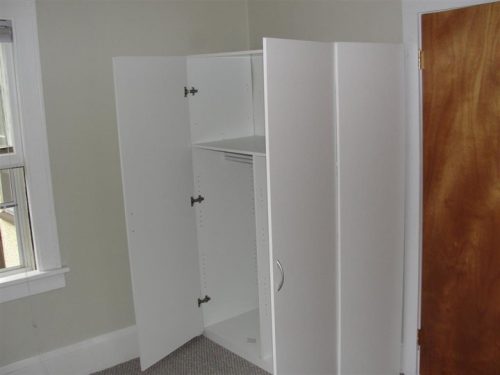
Everyone knows that you need a closet in a bedroom to call it a bedroom, right? While this is a universally accepted de facto standard, good luck finding any type of authority that will back this up. At least not here in Minnesota. As a home inspector, this isn’t something that concerns me, but I get asked about this frequently. Thankfully, it’s pretty simple: you don’t need a closet.
Minnesota Requirements
There’s nothing in the Minnesota State Building Code that requires a closet. I’m not aware of a single municipality that requires a closet. There’s also nothing in the Minneapolis Housing Maintenance Code that requires a closet. In fact, they go so far as to say this in the Minneapolis Truth-In-Sale of Housing Evaluator Guidelines:
NOTE: Sleeping rooms do not need a closet to be considered a sleeping room, per MHMC, although lenders may require that sleeping rooms have closets.
So where does this so-called ‘requirement’ come from? I don’t know. It had to be a standard somewhere, at some point, or it wouldn’t have so much traction today. But still, that’s a good point that the city of Minneapolis brings up about lenders possibly requiring a closet. I’ve heard that this used to be a requirement for FHA loans. Lenders can ask for whatever they want, and as a home inspector, I don’t attempt to guess at what lenders will want.
I’ve also heard through the grapevine that real estate agents weren’t supposed to list rooms without closets as bedrooms. Apparently, that requirement went away a very long time ago, but people have long memories.
So what if you’re buying or selling a home and someone gets hung up on the closet thing? How do you get around that? Let’s start by defining what a closet really is.
Closet Definition
The term ‘closet’ is defined by the building code as “A small room or chamber used for storage.” A chamber is “a natural or artificial enclosed space or cavity”. This means a 6″ box with a door that’s installed on the wall could be called a closet. Right?
Ok, maybe that’s silly. How about an armoire or a wardrobe? I’ve seen plenty of houses with only wardrobes in the bedrooms, and nobody had a problem with that. I’d argue that the cabinets, er… chambers shown below could be considered closets.


If someone insists that a room needs a closet to be called a bedroom, throw one of these in there. If someone argues that it’s not permanently installed, put a screw through it into the wall. There. Now it’s permanently installed.
Here at Structure Tech, we try to make a big deal about the big stuff and a little deal about the little stuff. This is little stuff.
The bottom line
Bedrooms do not need closets to be called bedrooms; at least not here in Minnesota. The next time someone tells you a bedroom needs a closet, ask for proof. If you find an authoritative reference that says a bedroom needs a closet anywhere in Minnesota, please share it with me.
AUTHOR: Reuben Saltzman, Structure Tech Home Inspections











